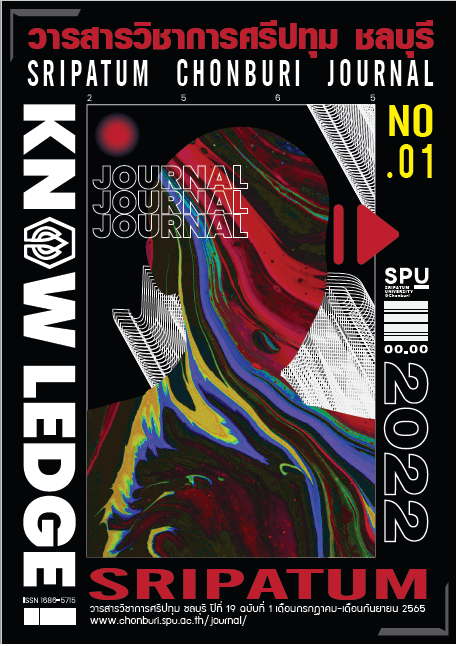THAI PRIMARY SCHOOL ENGLISH LANGUAGE TEACHERS’ SELF-EFFICACY
Keywords:
Self-efficacy, English teachingAbstract
Teacher’s qualification has raised concerns about the students’ performance in English learning in Thailand. This study investigated Thai primary school English language teachers’ self-efficacy, which is the belief about their ability to achieve desired goals. Questionnaires were randomly sent to 800 public primary schools under the Nakhonratchasima Primary Education Service Area Office. One English teacher from each school was asked to complete the questionnaire. The total number of 196 questionnaires was returned for analysis. The followed-up semi-structured interviews were conducted. The statistics used in the data analysis included descriptive analysis, analysis for means, correlational analysis, and comparative analysis. Frequency and percentages were used to analyze the general characteristics of the respondent concerning their field of study and years of teaching. The results showed variations in the levels of self-efficacy. The respondents reported their self-efficacy at the mean score of 3.40 (SD=0.54), which was at the moderate level. Significant differences occurred between the self-efficacy of English and non-English major teachers. A moderate level of self-efficacy was also perceived by all respondents in the Non-English major group (mean=3.21, SD=0.49). However, in the English major, only the Novice group viewed their efficacy at the moderate level (mean=3.48, SD=0.67), while the other two groups perceived their high level, with the mean score of 3.56 (SD=0.43) and 3.55 (SD=0.41), respectively. Certain patterns of teacher’s response were identified from the analysis of the interview data. The researchers concluded that teachers’ qualification influenced how teachers perceived their efficacy, which may affect their performance as a teacher of English.
References
Aslrasouli, M., & Vahid, M. S. P. (2014). An investigation of teaching anxiety among novice and experienced Iranian EFL teachers across gender.
Procedia - Social and Behavioral Sciences, 98, pp. 304–313.
Bandura, A. (1997). Self-efficacy: The exercise of control. New York, NY: W. H. Freeman.
Chacón, C. T. (2005). Teachers' perceived efficacy among English as a foreign language teachers in middle schools in Venezuela. Teaching
and Teacher Education, 21(3), pp. 257-272.
Damon, W. (2007). Dispositions and teacher assessment: The need for a more rigorous definition. Journal of Teacher Education, 58(5),
pp. 365-369.
Dhanasobhon, S. (2006). English language teaching dilemma in Thailand (Online). Available:
https://kukrdb.lib.ku.ac.th/journal/KERJ/search_detail/dowload_digital_file/200913/131100 [2018, June 23].
Dueraman, B. (2013). Focus on Thai learners of English: Their self-reports about foreign language learning. International Research Journal of
Arts and Social Sciences. 2(7) pp. 176-186.
Eslami, Z. R., & Fatahi, A. (2008). Teachers' Sense of Self-efficacy, English Proficiency, and Instructional Strategies: A Study of Nonnative EFL
Teachers in Iran. TESL-EJ, 11(4), p. 1-19.
Ghonsooly, B., Khajavy, G. H., & Mahjoobi, F. M. (2014). Self-efficacy and Metacognition as Predictors of Iranian teacher trainees’ academic
performance: A path analysis approach. Procedia-Social and Behavioral Sciences, 98, pp. 590-598.
Kesen, A., & Aydın, Z. (2014). Anxiety levels of novice and experienced EFL instructors: Istanbul Aydın University case. Procedia-Social and
Behavioral Sciences, 116, pp. 880-883.
Klassen, R. M., & Chiu, M. M. (2010). Effects on teachers’ self-efficacy and job satisfaction: Teacher gender, years of experience, and job
stress. Journal of Educational Psychology, 102(3), p. 741.
Klassen, R. M., & Tze, V. M. (2014). Teachers’ self-efficacy, personality, and teaching effectiveness: A meta-analysis. Educational Research
Review, 12, pp. 59-76.
Meristo, M., & Eisenschmidt, E. (2014). Novice teachers’ perceptions of school climate and self-efficacy. International Journal of Educational
Research, 67, pp. 1-10.
Office of the National Education Commission (ONEC). (2003). Education in Thailand 2002/2003. Bangkok: Amarin Printing and Publishing.
Oh, S. (2011). Preservice teachers’ sense of efficacy and its sources. Psychology, 2(3), p. 235.
Takahashi, H. (2014). Nonnative English-speaking teachers’ self-perceived language proficiency levels, anxieties, and learning strategies.
International Journal of Christianity and English Language Teaching, 1(1), p. 4.
Tschannen-Moran, M., Hoy, A., & Hoy, W. (1998). Teacher efficacy: Its meaning and measure. Review of Educational Research, 68(2),
pp. 202-248.
Wiriyachitra, A. (2002). English language teaching and learning in Thailand in this decade. Thai TESOL Focus, 15(1), p. 4-9.
Downloads
Published
Issue
Section
License

This work is licensed under a Creative Commons Attribution-NonCommercial-NoDerivatives 4.0 International License.
บทความทุกบทความเป็นลิขสิทธิ์ของวารสารวิชาการศรีปทุม ชลบุรี



